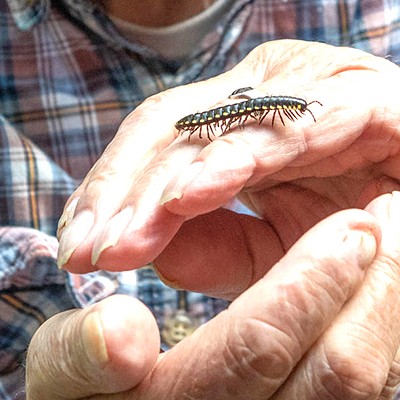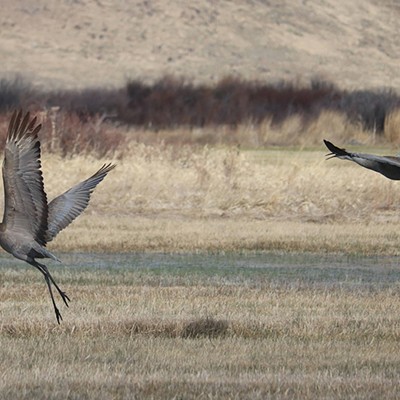The Good News? Just about every small bird loves to eat them, along with zillions of bats and fish.
The lifecycle of these tiny, pestiferous insects is linked to water - any kind of water - from snow melt to clean flowing creeks or dirty sewage water. Water is so important to mosquitoes they are usually identified by the water they come from.
The life expectancy of a mosquito depends on a lot of things: gender, and environmental temperature, time of year, and humidity. Generally speaking, an adult male mosquito will live for about a week, whereas a female mosquito can live up to a month.
There is one other element in the life cycle of the mosquito that is paramount for survival of the species; the female must have a blood meal in order to generate eggs. The males, bless their little pointy snouts, feed on flowers, as do their partners from time to time.
When I was given the opportunity to educate people en masse while serving as the "Naturalist of Sunriver," I took advantage of it. In addition to pointing out the need to take care of Earth in general and Sunriver in particular, I also preached the need for mosquitoes. To some (most) people, that was heresy.
"What the hell good are mosquitoes! Bellowed one irate resident, after coming off the golf course with red, itching welts on his neck and arms.
"Good point..." I said, meekly, but then mustered up the courage to add, "Hey, they're food for fish, swallows, night hawks and bats." However, that didn't go over very well, turned out he was a malaria survivor.
At the turn of the Century, military personnel infected with malaria returning from the Panama Canal provided mosquitoes the opportunity to spread the disease all over Texas. In 1907, however, Dr. Charles Campbell, MD and City of San Antonio bacteriologist, created the perfect natural control for mosquitoes. He built hundreds of "bat towers" around the state, imported millions of bats from Mexico and let Nature do the rest. Then he got the bright idea to sell the bat guano, which resulted in his writing a book in 1925 entitled, "Bats, Mosquitoes and Dollars."
WNV is a new disease; it appeared in 1999 in the East and over the ensuing years, spread to the West. In 2007, there were over three thousand cases reported in California that culminated in the death of 12 people. Oregon got off far better with only 26 cases and no deaths.
While mosquitoes are a reservoir and vector for WNV, birds also play a vital role as a reservoir for the disease, crows and their kin (Corvids) especially. The resulting encephalitis (brain fever) from WNV infections not only affects humans and birds, but also livestock, and especially horses. While humans cannot be vaccinated for WNV, horses can.
If you don't want mosquitoes living near your home, DO NOT allow water to stand for longer than 8 days. Not only does this prevent mosquito eggs from developing into adults, but it's also conscientious stewardship of water resources.
A female mosquito will lay several hundred eggs on water in the form of a raft which hatch within 24-48 hours and release larvae (wrigglers). Wrigglers occur in all kinds of standing water; ditches, woodland pools and stagnate bird baths - anything that holds water for more than a week. In about 7-10 days after the eggs hatch, larvae change to pupa before becoming adult mosquitoes.
Several days after emerging from the water, the female mosquito sets out to obtain a blood meal from an animal she can find. They're not fussy about what they suck blood from; snakes, mice, people, alligators, dogs, cats, sheep or cows - you name it - if it has hemoglobin in its blood it's "fair game."
So, what to do?
The Government's Center for Disease Control, CDC, strongly suggests repellants if you get into mosquito country. That's both good and bad advice as some people react strongly to certain repellants.
I would suggest you use a tiny bit on your skin and clothing, AS DIRECTED, and wait to see what, if anything, happens. (If a little bit is good, it doesn't necessarily mean that a whole lot is better!) There are also organic repellants that I recommend, but also use with caution. Go to the CDC website and troll around for further information.
Mosquito repellent clothing is very effective at keeping your tender skin free from bites, however it is sometimes hot and uncomfortable - but it beats sweating out a bad case of WNV.
If you cannot drain standing water around your place, try using Mosquito Fish (Gambusia). They will not escape and become an "Invasive Species," as they cannot survive our winters, and besides, kingfishers and garter snakes love 'em.
Bats, as mentioned, are dynamite on mosquitoes. If you want plans for a bat house to put up on your home or outbuildings, send me a 5x7 SAE (two stamps, please), and I will send you my (free) booklet for bat and bird-nesting boxes: P.O. Box 1513, Sisters, OR 97759.
Whatever you do to "control" mosquitoes, please do it with care and make certain what you do will not cause harm to others and the soil and water. Whatever actions we take to change things around us, we must be aware of our neighbors - be they fellow humans or mosquitoes.






















